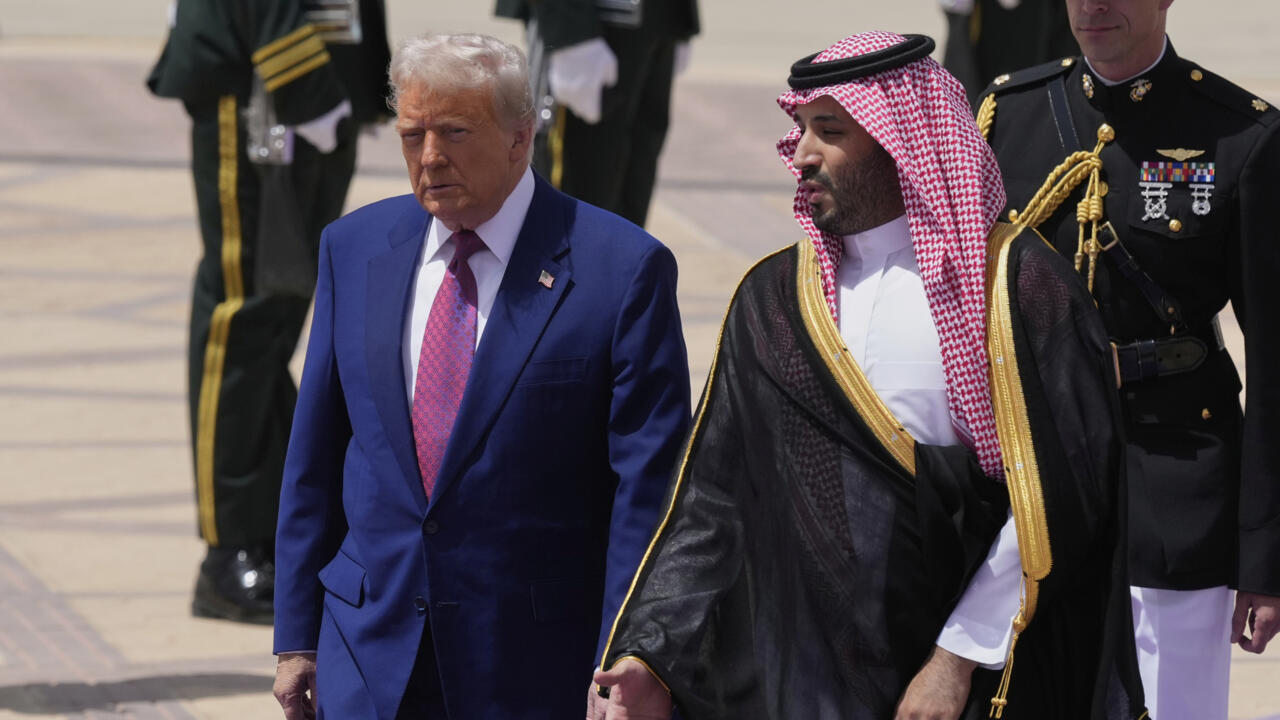U.S. President Donald Trump signed a series of significant economic and bilateral agreements during a visit to Saudi Arabia on Tuesday, May 13, 2025.
It marked the start of a four-day Middle East tour.
This trip focused on strengthening partnerships with key allies, particularly Saudi Arabia.
It comes even as ongoing concerns such as Iran’s nuclear ambitions and the Gaza conflict loom in the background.
Trump was greeted warmly by Crown Prince Mohammed bin Salman upon arrival at King Khalid International Airport in Riyadh.
The crown prince, widely seen as Saudi Arabia’s de facto ruler, received Trump at the aircraft stairs, after which the two proceeded to a grand hall at the airport.
There, Trump and his delegation were served traditional Arabic coffee by attendants adorned with ceremonial gun belts.
“I really believe we like each other a lot,” Trump remarked during a joint appearance with Prince Mohammed at the beginning of a bilateral meeting.
The two leaders proceeded to sign more than a dozen agreements aimed at enhancing cooperation between their respective militaries, justice systems, and cultural sectors.
Additional economic deals were anticipated at a U.S.-Saudi investment forum scheduled for later that day.
Prince Mohammed has previously pledged around $600 billion in Saudi investments in the United States.
However, Trump suggested the goal could be pushed further, quipping, “$1 trillion would be even better.”
The ceremonial atmosphere was evident even before Trump landed, with Royal Saudi Air Force F-15 jets providing an honorary escort to Air Force One as it approached Riyadh, an uncommon gesture.
The two leaders later participated in a formal luncheon at Al Yamamah Palace.
There they met with dignitaries in a lavish hall adorned with blue and gold accents and large crystal chandeliers.
During meetings with high-profile business leaders, Prince Mohammed appeared animated and smiling, a noticeable contrast to his 2022 encounter with then-President Joe Biden.
Biden had made efforts to minimize contact with the crown prince due to the backlash over the U.S. intelligence assessment linking him to the 2018 murder of journalist Jamal Khashoggi.
In contrast, Trump’s visit projected a more cordial relationship.
Prince Mohammed was seen alongside influential business figures like:
- Blackstone CEO Stephen Schwarzman,
- BlackRock CEO Larry Fink, and,
- Tesla and SpaceX CEO Elon Musk.
Later in the evening, the crown prince planned to host Trump for a private state dinner at Ad-Diriyah.
Ad-Diriyah is a UNESCO World Heritage site that is both the birthplace of the first Saudi state and the centerpiece of a major development project championed by the crown prince.
Saudi Arabia, along with its OPEC+ partners, had already begun to increase oil production early in Trump’s second term – a move welcomed by the administration.
Trump views low energy prices as a means to curb inflation and reduce the financial burden on Americans.
He also believes cheaper oil could help end the Russia-Ukraine war.
However, Saudi Arabia’s economy is still heavily reliant on oil revenues, needing prices near $96–98 per barrel to balance its budget.
On Monday, Brent crude was trading at just $64.77, raising questions about how long high production levels can be maintained.
Saudi Arabia was Trump’s first stop, chosen for its substantial investment commitments in the U.S.
However, he had previously diverted to Italy to attend Pope Francis’ funeral.
Notably, Saudi Arabia was also the first overseas destination of Trump’s first presidential term.
The other countries on this tour, Qatar and the United Arab Emirates, are also sites of large-scale Trump Organization real estate developments, including projects in Jeddah, Dubai, and Qatar.
Trump aims to showcase that his transactional approach to foreign policy is bearing fruit.
This is especially as he faces criticism from Democrats over his trade policies and stance on the Ukraine conflict.
He is expected to announce a series of deals with these Gulf nations, spanning areas like artificial intelligence, energy cooperation, and arms sales.
One such arms deal already received preliminary approval this month, allowing the U.S. to sell $3.5 billion in air-to-air missiles to Saudi Arabia.
Still, Trump’s decision to skip Israel on this trip raised eyebrows.
His administration recently paused a nearly two-month airstrike campaign against Yemen’s Houthi rebels.
He claimed the Iran-aligned group agreed to halt attacks on key shipping lanes.
The move caught Israel off-guard, as they were not informed in advance.
This was not the first time Israel was left in the dark.
Earlier this year, Prime Minister Benjamin Netanyahu was informed of U.S.-Hamas talks only after they had started.
Likewise, he learned of ongoing U.S.-Iran nuclear negotiations during a surprise Oval Office announcement by Trump.
Following Trump’s Houthi ceasefire announcement, Netanyahu declared, “Israel will defend itself by itself.
“If others join us — our American friends — all the better.”
William Wechsler remarked that Trump’s choice to omit Israel from his itinerary suggested Gulf states may currently have closer ties with Trump than Israel does.
Wechsler is a senior director at the Atlantic Council.
Nonetheless, Trump is looking to reignite efforts from his first term to normalize relations between Israel and Saudi Arabia.
His earlier Abraham Accords saw several nations — including the UAE, Bahrain, Morocco, and Sudan — recognize Israel.
However, Riyadh has outlined specific demands in exchange for normalization: U.S. security guarantees, help with its nuclear program, and genuine progress toward Palestinian statehood.
Given the ongoing war in Gaza and Israel’s aggressive military posture, progress on this front seems unlikely.
In a related development, Prince Mohammed hosted Palestinian Vice President Hussein al-Sheikh in Jeddah last week.
It marked the official’s first international trip since taking office in April — a move potentially signaling renewed diplomatic engagement.


